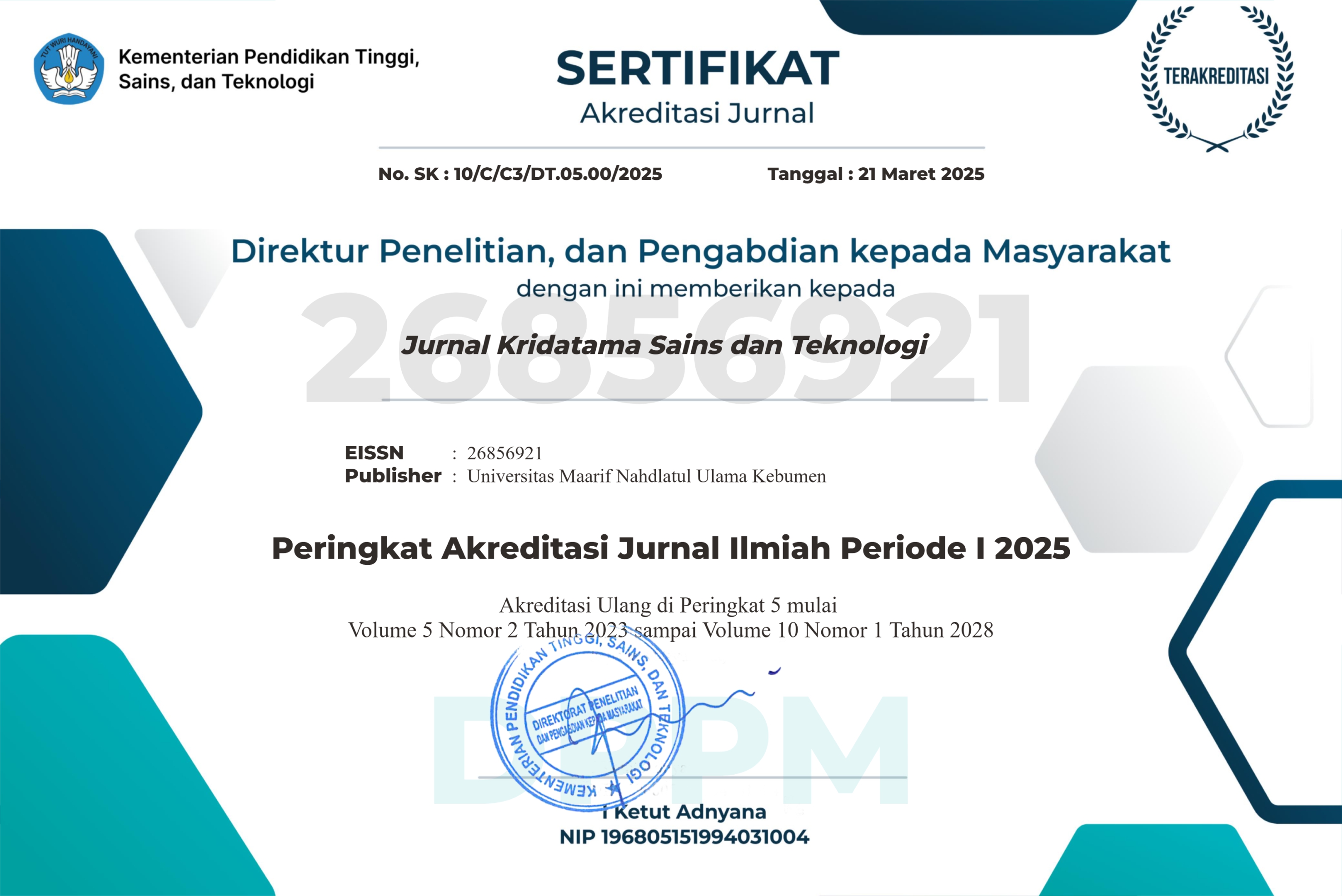Pemanfaatan Artificial Intelligence pada Pembelajaran dan Asesmen di Era Digitalisasi
DOI:
https://doi.org/10.53863/kst.v5i02.975Keywords:
Artificial Intelligence; Learning; Assessment; Era of DigitalizationAbstract
In facing the era of rapidly developing digitalization, the use of Artificial Intelligence (AI) technology has changed the learning paradigm and in-depth assessment as demonstrated through the application of Artificial Intelligence. AI helps teachers to carry out speeches optimally by utilizing the power of AI. However, on the other hand, AI has a negative impact on a person if it is not used properly. One of the advantages of AI is that it can do what humans do. With this advantage, AI can carry out activities carried out by humans, including the implementation of learning and assessment. Therefore, teachers need to utilize artificial intelligence in learning and assessment in the ever-growing digital era. The aim of this research is to investigate the application of AI in the context of learning and assessment, disseminate the methods used, and analyze the positive impact artificial intelligence produces. The research method used in this research is quantitative with a descriptive approach. The research results show that the use of AI in learning and assessment has increased the efficiency, accuracy and personalization of learning. Through machine learning algorithms, AI learning systems can identify individual student needs and deliver appropriate learning content, enabling a more relevant and effective learning experience. Additionally, in the context of assessment, AI has provided solutions for fast and objective automated assessments, reducing teacher workload and providing more in-depth feedback to students.
Keywords: Artificial Intelligence; Learning; Assessment; Era of Digitalization
References
A. Feldman, J. Monteserin, A. and Amandi. 2015. “Automatic Detection of Learning Styles.” state of the art. Artificial Intelligence Review 2(44): 157–86.
Abimanto, D., & Mahendro, I. 2023. “Efektivitas Penggunaan Teknologi Ai Dalam Pembelajaran Bahasa Inggris. Sinar Dunia: Pendidikan.” Jurnal Riset Sosial Humaniora Dan Ilmu: 256–66.
Bernard Maar dan Matt Ward. 2021. Artificial Intelligence in Practice. Jakarta: Alex Media Komputindo.
Burgess, A. 2017. “The Executive Guide to Artificial Intelligence: How to Identify and Implement Applications for AI in Your Organization.” Springer 3(1).
Coates, H., James, R. and Baldwin, G. 2013. “A Critical Examination of the Effects of Learning Management Systems on University Teaching and Learning.” Tertiary 1(2): 88–90.
David, D. 2021. “Artificial Intelligence As Solution In Facing The Age Of Digital Disruption 4.0. Judimas.” 1(1): 107–16.
J. Hendler. 2001. “Agents and the Semantic Web.” IEEE Intelligent Systems 16(2): 30–37.
J. Jamulia. 2018. “Identifying Students Learning Style Preferences At Iain Ternate.” International Journal of Education: 121–29.
Jaiswal, A., & Arun, C. J. 2021. “Potential of Artificial Intelligence for Transformation of the Education System in India.” International Journal of Education and Development Using Information and Communication Technology: 142–158.
Joupy G. Z. Mambu. 2023a. “Pemanfaatan Teknologi Artificial Intelligence (AI) Dalam Menghadapi Tantangan Mengajar Guru Di Era Digital.” Journal on Education 06(01): 88.
———. 2023b. “Pemanfaatan Teknologi Artificial Intelligence (AI) Dalam Menghadapi Tantangan Mengajar Guru Di Era Digital.” Journal on Education 6(1): 77–99.
M. El-Bishouty M.& S. Graf. 2014. “Smart E-Course Recommender Based on Learning Styles.” Computers in Education Journal 3(2): 88–90.
Manongga, D., Rahardja, U., Sembiring, I., Lutfiani, N., & Yadila, A. B. “Dampak Kecerdasan Buatan Bagi Pendidikan.” Adi Bisnis Digital Interdisiplin Jurnal 3(2): 41–55.
Mizoguchi R. & Bourdea J. “Using Ontological Engineering to Overcome Common AI-ED Problems.” International Journal of Artificial Intelligence in Education 11(3): 1–12.
Rachbini, W., & Evi, T. 2023. “Pengenalan Chatgpt Tips Dan Trik Bagi Pemula.” Cv. Aa. Rizky. 3(1): 44.
Raden Roro Widya Ningtyas Soeprajitno. 2019. “Potensi Artificial Intelligence (Ai) Menerbitkan Opini Auditor??” Riset Akuntansi dan Bisnis Airlangga 4(1): 44–60.
Rahajeng, L, S Harapan, and S K Mersy Karlin. 2022. “Jurnal Shanan.” 7(2): 243–62.
Rayendra, dkk. 2021. Kecerdasan Buatan. Solok: Mitra Cendekia media.
Rusmiyanto, R., Huriati, N., Fitriani, N., Tyas, N. K., Rofi’i, A., & Sari, M. N. 2023. “The Role Of Artificial Intelligence (Ai) In Developing English Language Learner’s Communication Skills.” Journal on Education 6(1): 750–57.
Suarifqi Diantama. 2023. “Pemanfaatan Artificial Intelegent (Ai) Dalam Dunia Pendidikan.” DEWANTECH 1(1): 8–14.
Supangat, Mohd Zainuri Bin Saringat, Roenadi Koesdijarto. 2021. “Pemanfaatan Artificial Intelligence (AI) Sebagai Respon Learning Style Mahasiswa.” (KONIK) E-ISSN:: 2807–1271.
T. Karsenti. 2019. “Artificial Intelligencein Education:The Urgent Need to Prepareteachers for Tomorrow’sschools. Formation et Profession.” 27(1): 105.
Vladan Devedži?. “Web Intelligence and Artificial Intelligence in Education.” Educational Technology & Society 7(4): 87–90.
Wiga Maulana Baihaqi, Fatma Sulistiyana, Azhar Fadholi. 2021. “Pengenalan Artificial Intelligence Untuk Siswa Dalam Menghadapi Dunia Kerja Di Era Revolusi Industri 4.0.” Jurnal: Pengabdian Kepada masyarakat 2(1): 67–88.
Downloads
Published
How to Cite
Issue
Section
License
Copyright (c) 2023 Arnolus Juantri E. Oktavianus,Lamhot Naibaho,Djoys Anneke Rantung

This work is licensed under a Creative Commons Attribution-ShareAlike 4.0 International License.
Authors retain copyright and grant the journal right of first publication with the work simultaneously licensed under a Creative Commons Attribution-ShareAlike 4.0 International License that allows others to share the work with an acknowledgment of the work’s authorship and initial publication in this journal

















